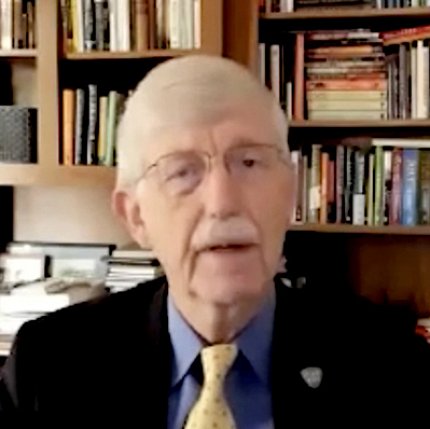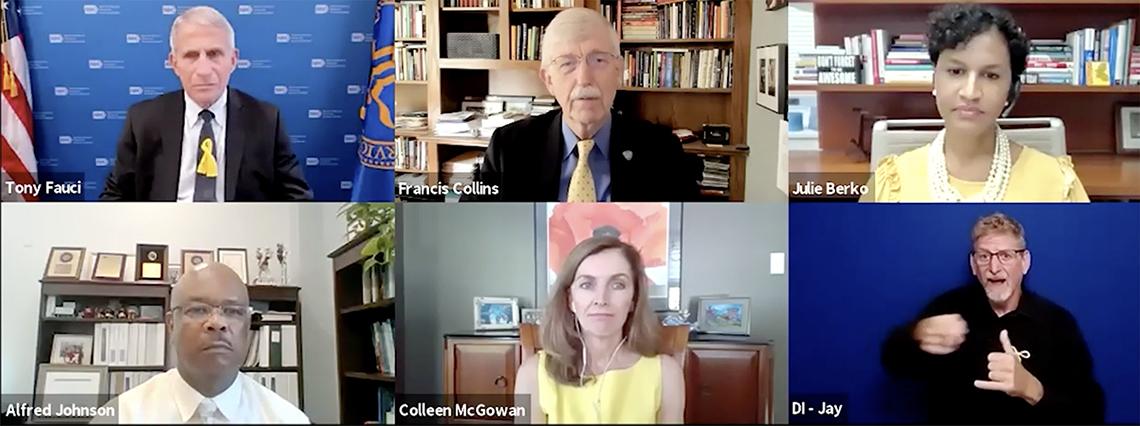‘Sticking Close to the Science’
8th Town Hall on Coronavirus Provides Updates, Outlook

NIH director Dr. Francis Collins moderated an 8th virtual town hall on coronavirus on Sept. 10 to provide a status update on Covid-19 and its impact on NIH’s community. Close to 14,500 people tuned in live, with nearly 1,000 viewing on demand via NIH VideoCast.
“I sincerely hoped the Covid-19 pandemic would have been mostly over by now,” he said. “But as we at NIH know—all too well—we are not there yet. The Delta variant had other plans.”
Joining him on screen were familiar pandemic point person (and President Biden’s chief medical advisor) NIAID director Dr. Anthony Fauci, NIH deputy director for management Dr. Alfred Johnson, Office of Research Services Director Colleen McGowan and Chief People Officer Julie Berko.
Presenters all wore the color yellow in recognition of National Suicide Prevention Day (Sept. 10), which Collins acknowledged as “another public health crisis.” Promoting active maintenance of mental health, especially during the past several months of varying degrees of unusual social isolation worldwide, has been an important point of emphasis. In addition, the town hall occurred the day before the U.S. marked the 20th anniversary of the 9/11 terrorist attacks.
The hour-long meeting’s agenda included briefings on the state of the pandemic, treatments and vaccines; new vaccination requirements for staff; and plans for eventual return to the physical workplace. NIH leadership also answered more than a dozen top frequently asked questions; more than 450 queries had been submitted in the weeks leading up to meeting day.
“Unfortunately, this is not where we thought we would be after the development of highly effective and safe vaccines,” Collins said. “The highly contagious nature of the Delta variant combined with—let’s be honest—less-than-optimal vaccination rates have played havoc with our nation’s efforts to return to normalcy, causing more cases, hospitalizations and deaths to reach now their highest level since winter. That means we still have a lot of hard work ahead of us.”
More than 40 million cases of Covid-19 have now been confirmed in the United States, Collins reported. The number is almost certainly larger, though, because many cases probably were not diagnosed, especially last year.
“In recent weeks,” Collins continued, “confirmed infections have averaged more than 150,000 a day. Even worse, deaths have been climbing up to about 1,500 a day and the daily average of hospitalized people is hovering around 100,000. That’s the highest since most Americans were eligible for vaccinations back in January. On a positive note, vaccination rates have been trending upward, with about 800,000 doses on average being administered in the U.S. each day.”
Still, he pointed out, about 80 million Americans have yet to get their first dose of any vaccine. “They are in real jeopardy from Delta,” Collins said.

In response to those vaccination numbers, President Biden had announced just the day before a six-point plan to try to get everyone age 12 or older vaccinated. The plan includes mandates that apply to all federal employees and contractors; mandates will no longer allow an option to refuse vaccination and undergo regular testing. Only legitimate medical or religious exceptions will be considered.
“Freedom is not just about rights,” Collins said, addressing a topic popular among people who have declined the shot(s). “It’s also about responsibilities. Those who are unvaccinated are putting others around them at risk, including immunocompromised people.”
Fauci used his opening remarks to outline both encouraging findings and remaining challenges.
“Everything about the real world effectiveness of the vaccines underscores the fact that they do work very well in virtually all circumstances in the United States and in every country in which the vaccines we utilize in the United States have been used,” he said. “I refer specifically and predominantly to the mRNA vaccines of Pfizer and Moderna as well, to a lesser degree, the [Johnson & Johnson] vaccine. You have heard us say that this is now an outbreak or a pandemic of the unvaccinated. That is the reason the President emphasized so strongly why it is so important to get people vaccinated…Some have interpreted that as an overreach, but it really is not. We have tried everything—from trusted messengers to making vaccines easily and readily available. [Vaccinations are] free, convenient, they work. Why not get it? That has really been the mantra that has guided us.”
Johnson provided a snapshot of Covid-19 in the NIH community.
As of Sept. 9, NIH had tested 19,035 staff members and recorded 1,749 index cases from NIH testing and community reports combined.
“We have detected 259 positive tests through our asymptomatic testing program,” he reported. “In terms of genomic analysis, our first Delta variant was detected on May 14. Since that time, 31 out of 53 samples analyzed have been the Delta variant. All samples analyzed after Aug. 31 have been the Delta variant.”
NIH’s vaccination rate has fluctuated between 67 percent and 70 percent, due to routine staff onboarding and off-boarding. In terms of positive tests after vaccination, there have been 174 cases. There have been 115 positive cases among staff who have been fully vaccinated.
McGowan talked about the vaccination requirements for employees, which had just shifted the previous day.
“President Biden’s executive order released yesterday mandates Covid-19 vaccinations for all federal employees and contractors in the Executive Branch, which includes NIH,” she explained. “This is a change from what we shared with you back in mid-August, as testing in lieu of vaccination is no longer an option unless you have a medical or religious exemption...
“There are a few things that haven’t changed,” McGowan said. “First, we continue to offer vaccines at our Occupational Medical Service clinic to all federal employees, contractors, fellows and tenants. We have plenty of appointments available. We also encourage you to take advantage of your community vaccination resources, if that’s more convenient...Second, we are planning to set up a Covid-19 booster clinic once we get more guidance from the FDA on approvals. For some of you, we might be able to time boosters in conjunction with our annual ‘Foil the Flu’ campaign, but we need more information.”
Berko briefly described deliberations involved in getting the majority of NIH’ers back to the physical workplace. Currently, most of the agency is functioning under maximum telework provisions. An HHS timeline suggests no sooner than November for full-staff returns.
“We do not currently know when we will be able to increase the number of staff working on site,” she said, “but we are actively planning for both the near and long term. The NIH response and recovery team will continue to be cognizant of current public health conditions and the predominance of the [coronavirus] variants, making sure that we are sticking close to the science and the data as it emerges.”
NIH has conducted and funded much of the science being relied upon during the pandemic. Collins reminded town hall viewers of NIH’s role from the earliest days of the worldwide health crisis, from development of the incredible breadth and depth of Covid-19 diagnostics, vaccines and treatments to remarkable efforts to share resources and disseminate information related to the pandemic.
“All of this is very swift and impressive progress,” he said. “And none of it would have been possible without decades of basic and clinical research, supported by NIH, preparing us for this kind of a challenge. So my thanks to all of you who have been all-hands-on-deck and must be pretty exhausted...But we have risen to the charge. We have delivered over and over again. You should be proud to be part of the National Institutes of Health—I know I am.”
NIH’ers can view the entire town hall at https://videocast.nih.gov/watch=42710.
